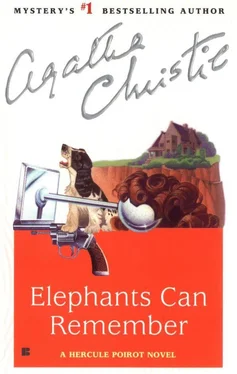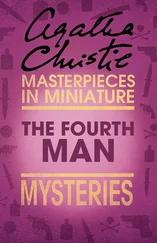Agatha Christie - Elephants Can Remember
Здесь есть возможность читать онлайн «Agatha Christie - Elephants Can Remember» весь текст электронной книги совершенно бесплатно (целиком полную версию без сокращений). В некоторых случаях можно слушать аудио, скачать через торрент в формате fb2 и присутствует краткое содержание. Год выпуска: 2004, ISBN: 2004, Издательство: Berkley, Жанр: Классический детектив, на английском языке. Описание произведения, (предисловие) а так же отзывы посетителей доступны на портале библиотеки ЛибКат.
- Название:Elephants Can Remember
- Автор:
- Издательство:Berkley
- Жанр:
- Год:2004
- ISBN:ISBN-13: 978-0425067826
- Рейтинг книги:3 / 5. Голосов: 1
-
Избранное:Добавить в избранное
- Отзывы:
-
Ваша оценка:
- 60
- 1
- 2
- 3
- 4
- 5
Elephants Can Remember: краткое содержание, описание и аннотация
Предлагаем к чтению аннотацию, описание, краткое содержание или предисловие (зависит от того, что написал сам автор книги «Elephants Can Remember»). Если вы не нашли необходимую информацию о книге — напишите в комментариях, мы постараемся отыскать её.
Elephants Can Remember — читать онлайн бесплатно полную книгу (весь текст) целиком
Ниже представлен текст книги, разбитый по страницам. Система сохранения места последней прочитанной страницы, позволяет с удобством читать онлайн бесплатно книгу «Elephants Can Remember», без необходимости каждый раз заново искать на чём Вы остановились. Поставьте закладку, и сможете в любой момент перейти на страницу, на которой закончили чтение.
Интервал:
Закладка:
"Well, of course I will."
"I'll give you the address." Mrs. Oliver gave it.
"Good. I'll be there. Yes, I know where that is quite well." Mrs. Oliver made a brief note on the telephone pad and looked with some annoyance at Miss Livingstone, who had just come into the room struggling under the weight of a large album.
"I wonder if this could possibly be it, Mrs. Oliver?"
"No, it couldn't," said Mrs. Oliver. "That's got cookery recipes in it."
"Oh, dear," said Miss Livingstone, "so it has."
"Well, I might as well look at some of them anyway," said Mrs. Oliver, removing the volume firmly. "Go and have another look. You know, I've thought about the linen cupboard.
Next door to the bathroom. You'd have to look on the top shelf above the bath towels. I do sometimes stick papers and books in there. Wait a minute. I'll come up and look myself." Ten minutes later Mrs. Oliver was looking through the pages of a faded album. Miss Livingstone, having entered her final stage of martyrdom, was standing by the door. Unable to bear the sight of so much suffering, Mrs. Oliver said: "Well, that's all right. You might just take a look in the desk in the dining room. The old desk. You know, the one that's broken a bit. See if you can find some more address books.
Early ones. Anything up to about ten years old will be worth while having a look at. And after that," said Mrs. Oliver, "I don't think I shall want anything more today." Miss Livingstone departed.
"I wonder," said Mrs. Oliver to herself, releasing a deep sigh as she sat down. She looked through the pages of the birthday book. "Who's better pleased? She to go or I to see her go?
After Celia has come and gone, I shall have to have a busy evening." Taking a new exercise book from the pile she kept on a small table by her desk, she entered various dates, possible addresses and names, looked up one or two more things in the telephone book and then proceeded to ring up Monsieur Hercule Poirot.
"Ah, is that you, Monsieur Poirot?"
"Yes, madame, it is I myself."
"Have you done anything?" said Mrs. Oliver.
"I beg your pardon-have I done what?"
"Anything," said Mrs. Oliver. "What I asked you about yesterday."
"Yes, certainly. I have put things in motion. I have arranged to make certain inquiries."
"But you haven't made them yet," said Mrs. Oliver, who had a poor view of what the male view was of doing something.
"And you, chere madame?"
"I have been very busy," said Mrs. Oliver.
"Ah! And what have you been doing, madame?"
"Assembling elephants," said Mrs. Oliver, "if that means anything to you."
"I think I can understand what you mean, yes."
"It's not very easy, looking into the past," said Mrs. Oliver. "It is astonishing, really, how many people one does remember when one comes to look up names. My word, the silly things they write in birthday books sometimes, too. I can't think why when I was about sixteen or seventeen or even thirty, I wanted people to write in my birthday book. There's a sort of quotation from a poet for every particular day in the year. Some of them are terribly silly."
"You are encouraged in your search?"
"Not quite encouraged," said Mrs. Oliver. "But I still think I'm on the right lines. I've rung up my goddaughter-"
"Ah. And you are going to see her?"
"Yes, she is coming to see me. Tonight between seven and eight, if she doesn't run out on me. One never knows. Young people are very unreliable."
"She appeared pleased that you had rung her up?"
"I don't know," said Mrs. Oliver, "not particularly pleased.
She's got a very incisive voice and-I remember now, the last time I saw her, that must be about ten years ago, I thought then that she was rather frightening."
"Frightening? In what way?"
"What I mean is that she was more likely to bully me than I would be to bully her."
"That may be a good thing and not a bad thing."
"Oh, do you think so?"
"If people have made up their minds that they do not wish to like you, that they are quite sure they do not like you, they will get more pleasure out of making you aware of the fact and in that way will release more information to you than they would have done if they were trying to be amiable and agreeable."
"Sucking up to me, you mean? Yes, you have something there. You mean then they tell you things that they thought would please you. And the other way they'd be annoyed with you and they'd say things that they'd hope would annoy you.
I wonder if Celia's like that? I really remember her much better when she was five years old than at any other age. She had a nursery governess and she used to throw her boots at her."
"The governess at the child, or the child at the governess?"
"The child at the governess, of course!" said Mrs. Oliver.
She replaced the receiver and went over to the sofa to examine the various piled-up memories of the past. She murmured names under her breath.
"Mariana Josephine Pontarlier-of course, yes, I haven't thought of her for years-I thought she was dead. Anna Braceby-yes, yes, she lived in that part of the world-I wonder now-" Continuing all this, time passed-she was quite surprised when the bell rang. She went out herself to open the door.
Chapter IV. Celia
A tall girl was standing on the mat outside. Just for a moment Mrs. Oliver was startled, looking at her. So this -was Celia. The impression of vitality and of life was really very strong. Mrs. Oliver had the feeling which one does not often get.
Here, she thought, was someone who meant something.
Aggressive, perhaps, could be difficult, could be almost dangerous perhaps. One of those girls who had a mission in life, who was dedicated to violence, perhaps, who went in for causes. But interesting. Definitely interesting.
"Come in, Celia," she said. "It's such a long time since I saw you. The last time, as far as I remember, was at a wedding.
You were a bridesmaid. You wore apricot chiffon, I remember, and large bunches of-I can't remember what it was, something that looked like goldenrod."
"Probably was goldenrod," said Celia Ravenscroft. "We sneezed a lot-with hay fever. It was a terrible wedding. I know. Martha Leghorn, wasn't it? Ugliest bridesmaids' dresses I've ever seen. Certainly the ugliest I've ever worn!"
"Yes. They weren't very becoming to anybody. You looked better than most, if I may say so."
"Well, it's nice of you to say that," said Celia. "I didn't feel my best." Mrs. Oliver indicated a chair and manipulated a couple of decanters.
"Like sherry or something else?"
"No. I'd like sherry."
"There you are, then. I suppose it seems rather odd to you," said Mrs. Oliver. "My ringing you up suddenly like this."
"Oh, no, I don't know that it does particularly."
"I'm not a very conscientious godmother, I'm afraid,"
"Why should you be, at my age?"
"You're right there," said Mrs. Oliver. "One's duties, one feels, end at a certain time. Not that I ever really fulfilled mine. I don't remember coming to your confirmation."
"I believe the duty of a godmother is to make you learn your catechism and a few things like that, isn't it? Renounce the devil and all his works in my name," said Celia. A faint, humorous smile came to her lips.
She was being very amiable but all the same, thought Mrs. Oliver, she's rather a dangerous girl in some ways.
"Well, I'll tell you why I've been trying to get hold of you," said Mrs. Oliver. "The whole thing is rather peculiar. I don't often go out to literary parties, but as it happened I did go out to one the day before yesterday."
"Yes, I know," said Celia. "I saw mention of it in the paper, and you had your name in it, too, Mrs. Ariadne Oliver and I rather wondered because I know you don't usually go to those sort of things."
Читать дальшеИнтервал:
Закладка:
Похожие книги на «Elephants Can Remember»
Представляем Вашему вниманию похожие книги на «Elephants Can Remember» списком для выбора. Мы отобрали схожую по названию и смыслу литературу в надежде предоставить читателям больше вариантов отыскать новые, интересные, ещё непрочитанные произведения.
Обсуждение, отзывы о книге «Elephants Can Remember» и просто собственные мнения читателей. Оставьте ваши комментарии, напишите, что Вы думаете о произведении, его смысле или главных героях. Укажите что конкретно понравилось, а что нет, и почему Вы так считаете.












